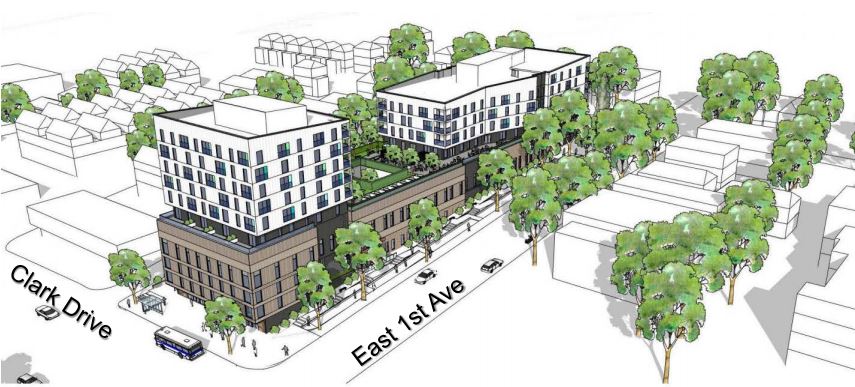Vancouver city council on Thursday unanimously approved a rezoning application that clears the way for a large detox and social housing complex in east Vancouver.

The approval came after a two-day public hearing that saw dozens of speakers give support and voice opposition to the project, which is being touted as the largest of its kind in B.C. and is designed to address the twin affordability and addiction crises.
The large land parcel set for the complex on East First Avenue between Clark Drive and McLean Drive is owned by the city, which is partnering with BC Housing and Vancouver Coastal Health (VCH) to build the project.
“We know this city needs affordable housing for low-income residents, we know we need more treatment beds and services for people suffering with substance abuse, so it’s very important we be able to service as many of these citizens as possible,” BC Housing’s regional director of operations Brenda Prosken said.
The excitement for the project was echoed by VCH director of community health services Bonnie Wilson, who was present for the vote.
“This project will help address two urgent needs in our community: housing and support for people struggling with problematic substance use,” Wilson said in a statement.
“We want to thank city council for their trust and we’re committed to being good neighbours at our new home.”
The complex is set to include 90 social housing units, a withdrawal management center with 51 in-patient treatment beds and other addiction treatment services, and a “social enterprise space” aimed at providing Indigenous services.
BC Housing plans to rent out half of those housing units at or below housing income limits (HILs) rental rates. The remaining units would be rented at current private rental market rates set by the Canadian Mortgage and Housing Corporation (CMHC).
Current HILs rates price a one-bedroom unit at $1,080 for a household earning $43,500 a year, while a household earning $58,000 could afford a $1,300 rent for a two-bedroom. CMHC rates set a one-bedroom at $1,730 for households earning $69,000 and a two-bedroom at $2,500 for households earning $100,000.

Get daily National news
The withdrawal management centre will also include 20 transitional beds, out-patient and home-based medical support, a sobering centre, and academic teaching and research services for staff.
The city plans to partner with the Metro Vancouver Aboriginal Executive Council to operate the social enterprise space, which will offer Indigenous employment services along with healing and wellness development.
WATCH: Coverage of B.C. housing projects on Globalnews.ca
Ahead of the public hearing, the city received roughly 180 written submissions supporting the project, including a letter signed by 89 UBC medical students. More than 80 letters and emails were submitted in opposition.
The majority of speakers at the hearing said having such a facility in the Grandview-Woodland community would be a benefit.
“We need more of these services and we need them on a large scale,” local resident and detox worker Scott Neufeld said, while showing photos of other residents who support the project.
“Supporting a large-scale project like this sends a message that the city is taking bold action to address these issues immediately.”
WATCH: Coverage of addiction treatment programs on Globalnews.ca
Benjamin Hertwig, who lives and works in the neighbourhood who also served as a housing and crisis diversion worker in Edmonton, said the city had the chance to set a precedent for other Canadian cities to follow.
“In the midst of a housing and opioid crisis, delaying this project would represent not only a missed opportunity for the city, but will result in harm for those most deeply affected,” he told council.
Opponents, while not discounting the need for withdrawal services and social housing, were mostly concerned with the size of the proposed facility.
In its current design, the tallest part of the building would rise 100 feet up from the corner of Clark and East First. That goes against the area’s community plan, opponents argued.
“It seems to me that the design, size, and location of this project were predetermined with community consultation merely being an afterthought,” local resident and Metlakatla First Nation member Rodney Hynes said, adding the size of the proposed facility doesn’t fit with the rest of the neighbourhood.
Mayor Kennedy Stewart thanked his fellow councillors for voting for the rezoning, saying in a statement that the facility will “contribute positively to the local community.”
“We are pleased to be working alongside BC Housing and Vancouver Coastal Health on this important project which would provide vital housing, health services and job space for Vancouver’s residents in a development that is responsibly and safely managed,” Stewart said.
The city is contributing the land, which is valued at $16.7 million. The total cost of the project has yet to be determined, but construction costs are estimated to be roughly $46.5 million.
The project will now go into the development approval process. If it passes, the city says construction could begin in early 2020.
- Vancouver doctor facing sex assault charges involving 2 teen patients
- Prince Rupert man feared a ‘hit’ had been ordered before his family’s death, inquest hears
- ‘Hard to believe’: Almost one year since B.C. mother Jennifer Provencal disappeared
- 3 men arrested for Surrey extortion-related shooting are foreign nationals, police say





















Comments